The Galapagos connection
Being the Change
Carole Baldwin ('81) mentors Zach Foltz ('08) and helps him reel in his dream job
By Brad Jenkins ('99)
Adapted to help one another
Before heading to her windowless office in the bowels of the Museum of Natural History in Washington, D.C., Carole Baldwin ('81) often stops at an aquarium that's part of an exhibit she helped create. Inside, colorful fish swarm into crevices and over a sandy bottom. The orange, blue and yellow fish are the most eye-catching, but Baldwin spends much of her morning visits watching one shrimp. It uses long, threadlike antennae and follows a bland-looking fish almost everywhere it goes. This fish — Baldwin calls him Gomer Pyle because of the goofy look on his face — protects the shrimp, which is blind. The shrimp, meanwhile, digs out shelter for the two.
The creatures have adapted to help one another, and each time she tells visitors about them, she is as enthusiastic as if it's the first.
She hasn't only told the story before. She has lived it the past three years as she has guided Zach Foltz ('08) from an uncertain junior biology major trying to figure out how to break into marine biology into a promising scientist who just got his first job overseeing a Smithsonian-leased island off Belize.
JMU symposium leads to internship
Baldwin met Foltz in 2007, when she returned to JMU to speak at a symposium. Knowing Foltz was looking for an internship, a professor invited him to join Baldwin and other students for lunch. At the time, Foltz didn't know that Baldwin was a star in the marine biology world. She became especially popular in 1998 while starring as one of several scientists in the IMAX documentary Galapagos!, which followed scientists into the depths of the eastern Pacific. A systematic ichthyologist — a scientist who studies the diversity of and relationships among fish species — Baldwin is curator of fishes at the Smithsonian's National Museum of Natural History.
Baldwin soon offered Foltz an internship and a chance to research with her. She then advised him as he interviewed for and received a full-time job managing a research island off Belize. This summer, the two discussed their relationship:
Carole Baldwin: When I got back from my talk at JMU, I received an e-mail from Zach asking if I needed an intern. The first thing I asked was whether he was willing to volunteer, because I didn't have any funding. I told him that I had a student working on a fish project in Florida and he could use some help. The project was to help re-analyze the number of fish species in the Caribbean. Traditionally, we've always done it based on picking up a preserved fish and counting fin rays and looking at pigment and scales, etc.; and now, we're adding DNA to that. We are finding dozens and dozens of new species, which is surprising because scientists thought we were done with assessing Caribbean fish diversity decades ago. So the job was spending the summer catching at least one of every fish species that you can. And Zach's a fisherman.
Zach Foltz: I was like, "Wait a minute; you really just want me to go collect fish every day? That's it?"
Baldwin: Well, that's the fun part. There's a bit more to the lab part after you go and do all the fun collecting and catching fish. Zach ended up being a natural at collecting fish and did a phenomenal amount of collecting. It wasn't just his field capabilities; his organizational and people skills were fabulous. Being put in that situation so young and handling it so well was really impressive. I wanted him to keep working on the project. In fact, in May 2008, my research group was going to our research station in Belize, and I asked Zach to join us. The Belize station is a one-acre island, and it holds about six scientists, a cook and a station manager. I arranged to have a big boat take us out to some of the other islands off the coast. Zach and I did a couple of dives. One of the fish that we collected was a new species of Cardinal fish.
Madison connections yield an "awesome" job
Foltz: About a year ago, I found out that the island's station manager was considering retiring. I thought, "He has an awesome job. I would do anything to have that job."
Baldwin: Zach's e-mails to me about this job were like: "That is my job. … It is made for me." That kind of attitude. I thought he'd be perfect, but he didn't have any experience running a lab.
Foltz:That's exactly what I thought.
Baldwin: Two of the people on the search committee for the job worked at the Florida lab where Zach worked at the time. He fit in so well and made a lot of really good connections. That all came full circle when he applied for the station manager job. The head of the search committee called me and asked what I thought. I said, "You know what I think."
Foltz:I applied at the end of July, and didn't hear anything for a while. And then, I got an e-mail from the director and she wanted to have an interview with me. She said that I was in the top three people, and I knew I had a chance.
Baldwin: I'm really proud of Zach. He did everything right. He got excited about something at school, he followed up on it and talked to his professor, who connected him to me. That started the whole ball rolling.
